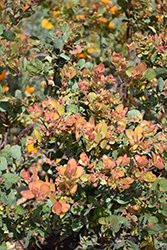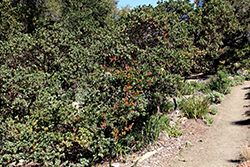It's all about ...
plants

Canyon Blush Manzanita
Arctostaphylos 'Canyon Blush'
Height: 4 feet
Spread: 20 feet
Sunlight:
![]()
![]()
Hardiness Zone: 8b
Description:
A massive groundcover selection that features striking, red flushed new foliage and blush pink flowers in mid-winter, followed by red fruit; tolerates heavy soils that are well drained; great for cascading down slopes
Ornamental Features
Canyon Blush Manzanita features dainty nodding pink bell-shaped flowers at the ends of the branches from late winter to early spring. It has attractive green foliage with hints of silvery blue which emerges red in spring. The oval leaves are highly ornamental and remain green throughout the winter. It produces red berries from mid to late summer.
Landscape Attributes
Canyon Blush Manzanita is a dense multi-stemmed evergreen shrub with an upright spreading habit of growth. Its relatively fine texture sets it apart from other landscape plants with less refined foliage.
This is a relatively low maintenance shrub, and should only be pruned after flowering to avoid removing any of the current season's flowers. It is a good choice for attracting birds, bees and butterflies to your yard, but is not particularly attractive to deer who tend to leave it alone in favor of tastier treats. It has no significant negative characteristics.
Canyon Blush Manzanita is recommended for the following landscape applications;
- Accent
- Mass Planting
- Border Edging
- Groundcover
- Container Planting
Planting & Growing
Canyon Blush Manzanita will grow to be about 4 feet tall at maturity, with a spread of 20 feet. It tends to fill out right to the ground and therefore doesn't necessarily require facer plants in front. It grows at a slow rate, and under ideal conditions can be expected to live for approximately 30 years.
This shrub does best in full sun to partial shade. It is very adaptable to both dry and moist growing conditions, but will not tolerate any standing water. It is considered to be drought-tolerant, and thus makes an ideal choice for xeriscaping or the moisture-conserving landscape. This plant will benefit from an application of bonemeal and/or mycorrhizal fertilizer at the time of planting. It is very fussy about its soil conditions and must have sandy, acidic soils to ensure success, and is subject to chlorosis (yellowing) of the foliage in alkaline soils, and is able to handle environmental salt. It is somewhat tolerant of urban pollution. This particular variety is an interspecific hybrid.
Canyon Blush Manzanita makes a fine choice for the outdoor landscape, but it is also well-suited for use in outdoor pots and containers. With its upright habit of growth, it is best suited for use as a 'thriller' in the 'spiller-thriller-filler' container combination; plant it near the center of the pot, surrounded by smaller plants and those that spill over the edges. It is even sizeable enough that it can be grown alone in a suitable container. Note that when grown in a container, it may not perform exactly as indicated on the tag - this is to be expected. Also note that when growing plants in outdoor containers and baskets, they may require more frequent waterings than they would in the yard or garden. Be aware that in our climate, most plants cannot be expected to survive the winter if left in containers outdoors, and this plant is no exception. Contact our experts for more information on how to protect it over the winter months.
This plant is not reliably hardy in our region, and certain restrictions may apply; contact the store for more information.

